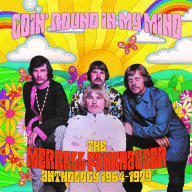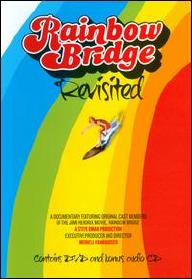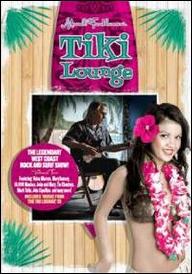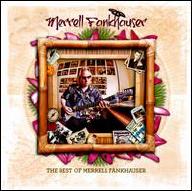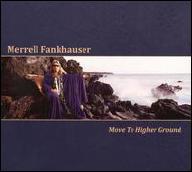Fankhauser was born on December 23, 1943, in Louisville, Kentucky. At the age of 11, he was given a ukulele by his father, who taught him how to play. When he was 14 years old, Fankhauser's family moved to San Luis Obispo, California, and he took a job picking strawberries to earn enough money to buy an electric guitar. Fankhauser begin practicing with a high-school pal, Bill Dodd, and in 1961 they played a talent show as a duo, where they took first place over a surf group called the Impacts. The Impacts wasted no time asking Fankhauser to join them, and in 1962 they cut an album for Del-Fi Records titled Wipe Out (no relation to the 1963 hit by the Surfaris). The album sold well in California, though the experience left a bitter taste with the bandmembers after they discovered they had signed away their royalties and publishing. Fankhauser left the group and relocated to Lancaster, California, where he formed a group called Merrell the Exiles with guitarist Jeff Cotton, bassist Larry Willey, and drummer John French, specializing in British Invasion-influenced pop/rock. Cotton and French would soon leave the group to join a blues band led by Don Van Vliet, who would adopt the stage name Captain Beefheart; he also renamed Cotton "Antennae Jimmy Semens" and French "Drumbo."
Undaunted, Fankhauser assembled a new lineup of the Exiles, and in 1964 their single "Please Be Mine" became a regional hit. By 1967, Merrell the Exiles had faded out, and Fankhauser formed a new band with Bill Dodd on guitar, Dan Parrish on bass, and Dick Lee on drums. Glen McArthur, a producer and engineer whose label had released the Merrell the Exiles singles, was interested in cutting an album with the new band, and taking the first letters from the last name of each member, they came up with the name Fapardokly. A charming blend of folk-rock and light psychedelia, the Fapardokly album didn't sell well on initial release, but it would later become a sought-after collectors' item among psychedelic fans. Once Fapardokly ran its course, Fankhauser formed a more pop-oriented psych group, Merrell Fankhauser H.M.S. Bounty, with Bill Dodd on keyboards and guitar, Jack Jordan on bass, and Larry Meyers on drums. H.M.S. Bounty scored a record deal with the Uni label, and they released an album in 1968, Things. While the group toured extensively behind the album and received scattered airplay, poor promotion stalled the album's sales, and by 1970 Fankhauser had moved on.
Fankhauser had become fascinated with the legend of a lost continent off the coast of Hawaii called Mu, and as he teamed up with Jeff Cotton (back from his stint with Beefheart) on guitar and reed instruments, Larry Willey on bass, and Randy Wilmer on drums, he dubbed the new group Mu. Mu's self-titled debut album, a beguiling mix of psychedelia, blues, and prog rock, came out in 1971 on the independent RTV label, and was reissued by United Artists in 1974 as Lemurian Music. By the time the UA edition had appeared, the band had relocated from California to Maui, Hawaii, but while Mu recorded enough material for a second LP, the material went unreleased until the '80s, appearing under the titles End of an Era and The Last Album. Mu broke up in 1975, and Fankhauser started work on his first solo album; The Maui Album was issued in 1976, but in the years following, the guitarist put his focus on performing live in the Hawaiian Islands.
In the late '70s and early '80s, Fankhauser's work, especially his more psychedelic projects, began attracting a new audience among collectors and crate-diggers, and a number of his albums were reissued in pirate pressings; several would reappear in authorized editions from Sundazed Records. In 1986, Fankhauser released a studio set, Doctor Fankhauser, that included guitar work from John Cipollina of Quicksilver Messenger Service. Another studio set, Message to the Universe, was released the same year, and in 1990 Fankhauser became the host of a syndicated television show, California Music, that ran for three seasons. In 1995 Fankhauser launched another series, Route 66 Live, and in 2001 he began hosting a Hawaiian-themed music show, The Tiki Lounge. In the 21st century, in between TV commitments, Fankhauser released a steady stream of albums for various independent labels (more than a dozen between 2000 and 2014) that moved between upbeat rock & roll, often in the surf guitar vein, and more adventurous material that documented his continued interest in Mu. In 2018, Fankhauser issued Tiki Lounge Live, featuring performances by Merrell and his guests from his long-running television series. In 2022, the British Cherry Red label issued Goin' Round In My Mind: The Merrell Fankhauser Anthology 1964-1979, an expansive six-disc box set that included plentiful material from Fankhauser's major groups of the era, including Merrell the Exiles, Fapardokly, Merrell Fankhauser H.M.S. Bounty, and Mu, as well as extensive liner notes. ~ Mark Deming, Rovi


